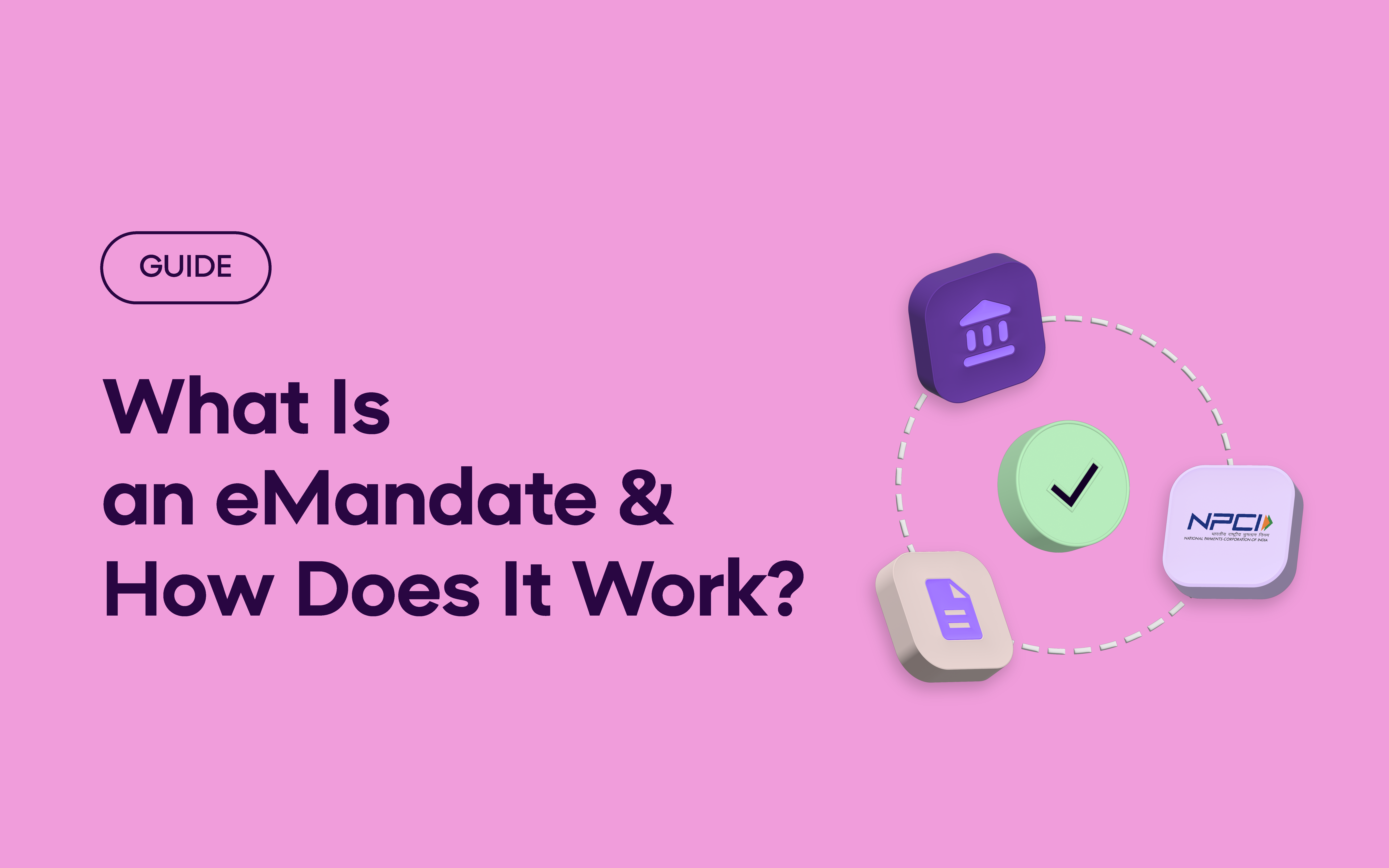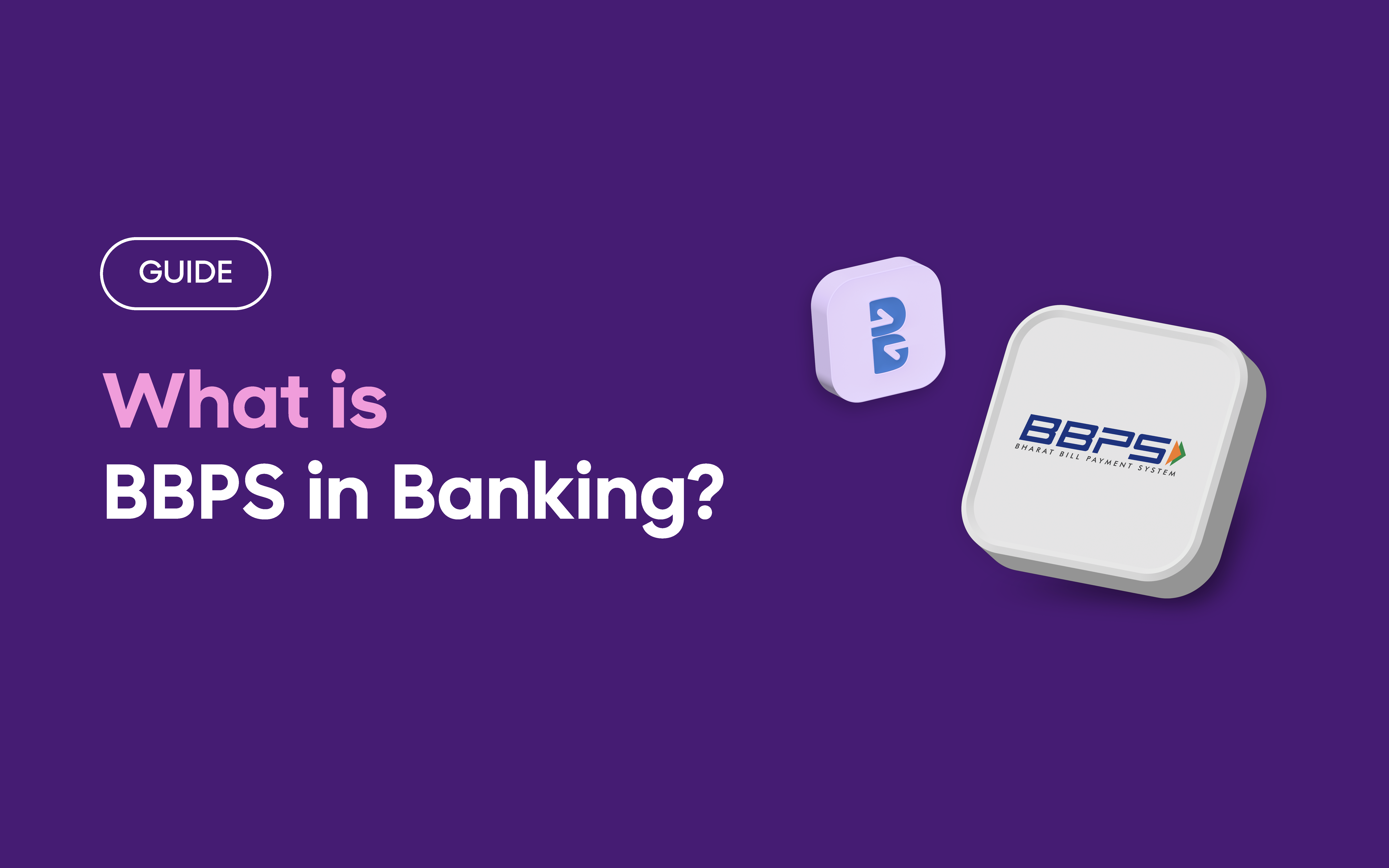Recurring payments are becoming the norm—whether it’s subscription platforms, SIPs (Systematic Investment Plans), loan repayments, or utility bills. And at the heart of these automated transactions lies a powerful tool: the eMandate.
In this blog, we’ll explain everything you need to know about eMandates—what they are, how they work, their benefits, and how businesses can leverage them to improve cash flow and customer experience.
What Is an eMandate?
An eMandate is a digital payment instruction initiated by the customer, allowing businesses or financial institutions to debit funds automatically from their bank account at fixed intervals.
Think of it as a standing instruction—just faster, paperless, and entirely online.
Introduced by the Reserve Bank of India (RBI) and the National Payments Corporation of India (NPCI), eMandates aim to simplify and digitize the process of setting up recurring payments using either NACH (National Automated Clearing House) or UPI.
How Does an eMandate Work?
Here’s how the typical eMandate process works:
1. Authorization by the Customer
The customer initiates the eMandate through a service provider’s website or app. They choose a recurring payment option and enter bank account or UPI details.
2. Authentication
The customer authenticates the mandate via net banking, debit card, or UPI PIN. This step ensures security and user consent.
3. Mandate Registration through NPCI
Once authorized, the bank registers the eMandate through NPCI. The process usually takes 1-2 business days for NACH mandates and happens instantly for UPI eMandates.
4. Recurring Debit
After registration, the business can auto-debit the customer’s account based on the defined amount and schedule—daily, monthly, or annually.
Types of eMandates
Not all eMandates are created equal. In India, eMandates typically fall under two major categories—NACH eMandates and UPI AutoPay. Each serves the same core purpose but uses different mechanisms for authorization and payment processing.
Here’s a breakdown:
1. NACH eMandate
NACH (National Automated Clearing House) eMandates are backed by the NPCI and supported by most major banks in India. These are ideal for high-value or long-term recurring transactions.
How it works:
- Customers authorize the mandate using net banking or debit card.
- The mandate is registered with the sponsor bank and NPCI.
- Once approved, recurring debits are initiated on the scheduled date.
Use cases:
- SIPs (stocks and mutual funds)
- Loan EMI payments
- Insurance premium payments
- Subscription billing for SaaS and OTT platforms
Processing time:
Typically takes 1–2 business days to activate.
2. UPI AutoPay
Introduced by NPCI, UPI AutoPay is a faster, mobile-first alternative designed for real-time mandate creation. It allows users to set up recurring payments using any UPI app like Google Pay, PhonePe, Paytm, or BHIM.
How it works:
- Customers authorize the mandate by entering their UPI PIN on their preferred app.
- Once approved, the mandate is instantly registered.
- Customers receive reminders before every debit, and payments happen automatically.
Use cases:
- Monthly OTT subscriptions
- Gym memberships
- Utility bills
- Low-ticket recurring spends
Processing time:
Instant mandate creation and activation.
Why it’s gaining popularity:
- No need for net banking or debit card
- Works seamlessly on mobile devices
- Instant confirmation and high success rates
Card-on-File & Credit Card Mandates
While not strictly an “eMandate” under NACH or UPI, recurring payments using credit cards are widely used in India—especially for OTT subscriptions, online services, and SaaS platforms.
In this model, users allow merchants to save their card details (also called card-on-file) and debit the card at fixed intervals. These transactions are governed by RBI’s tokenization and Additional Factor of Authentication (AFA) rules.
How it works:
- Customers enter their card details and opt for recurring billing.
- The card is tokenized (i.e., actual card number is replaced with a unique code).
- Users approve the first transaction via OTP.
- For recurring payments above ₹15,000 (as per latest RBI guidelines), additional consent is required before each debit.
Use cases:
- OTT platforms (Netflix, Hotstar)
- Cloud software subscriptions (Adobe, Google Workspace)
- App store payments
Key difference:
Unlike NACH or UPI eMandates, these fall under card network rules (Visa/Mastercard/Rupay) and RBI guidelines on recurring card payments.
Processing time:
Instant, once tokenized and approved.
eMandate in SIP: Why It Matters
SIPs (Systematic Investment Plans) are one of the most common use cases for eMandates in India.
Instead of logging in every month to invest, users can set up an eMandate and let it handle their SIPs automatically. It ensures:
- No missed payments
- Consistent wealth creation
- A hands-free experience
Today, most mutual fund houses and investment apps mandate eMandates for SIPs above a certain amount to ensure reliability.
Benefits of Using eMandates
Whether you’re a business owner or an investor, here’s why eMandates matter:
For Businesses:
- Faster collections: No follow-ups needed for recurring dues.
- Lower operational costs: Say goodbye to physical paperwork and manual reconciliations.
- Improved cash flow: Predictable incoming payments help in better financial planning.
- Enhanced user experience: Frictionless onboarding and billing for customers.
For Customers:
- Convenience: Set it once and forget it.
- Security: Two-factor authentication ensures secure setup.
- Transparency: Customers are notified before every debit.
Is eMandate Safe?
Yes—extremely safe.
All eMandates are authenticated via secure banking channels. Banks, NBFCs, and fintech platforms follow RBI-compliant protocols like two-factor (2FA) and OTP verification.
In fact, UPI-based eMandates have an added layer of security since customers must approve the mandate through their UPI apps.
Who Should Use eMandates?
- Subscription platforms (OTT, SaaS, etc.)
- Investment apps for SIPs
- NBFCs and lenders for EMI collections
- Insurance providers for premium collections
- Utility service providers for recurring bill payments
In short, any business or individual dealing with periodic payments can benefit from eMandates.
Endnote
eMandates are no longer optional—they’re a necessity for businesses and customers who want automation, convenience, and security. As India continues its digital payments journey, embracing eMandates could be your smartest move yet.
Frequently Asked Questions
Is eMandate the same as auto-debit?
Yes, eMandate is the digital mechanism that authorizes auto-debits from a customer’s bank account.
Can I cancel an eMandate?
Absolutely. Customers can cancel their mandates anytime via the merchant or their bank.
What’s the difference between NACH and UPI eMandates?
NACH mandates are processed by NPCI and involve net banking or debit card authentication. UPI eMandates are real-time and verified via UPI apps like PhonePe or Google Pay.
What happens if there’s insufficient balance during an auto-debit?
The debit will fail, and in some cases, a bounce charge may be applied by your bank or service provider. Repeated failures may lead to mandate cancellation.
Can I set up an eMandate without internet banking?
Yes, you can use debit cards or UPI apps (for UPI AutoPay) to authenticate the eMandate without relying on internet banking.
How long does it take for an eMandate to become active?
NACH eMandate: Usually takes 1–2 working days for bank verification.
UPI AutoPay and Card Mandates: Activated instantly after approval.
Can eMandates be modified after setup?
Yes, customers can modify the amount, frequency, or even cancel the mandate via their bank or the service provider’s portal, depending on the platform’s capabilities.
What is the difference between a mandate and an eMandate?
A mandate is a general instruction to a bank to allow auto-debits. An eMandate is the digital version of that mandate—set up online without physical paperwork.
Is there any charge for setting up an eMandate?
Most platforms offer free eMandate setup for customers. However, some banks or service providers may apply nominal charges depending on the transaction volume or mandate type.





